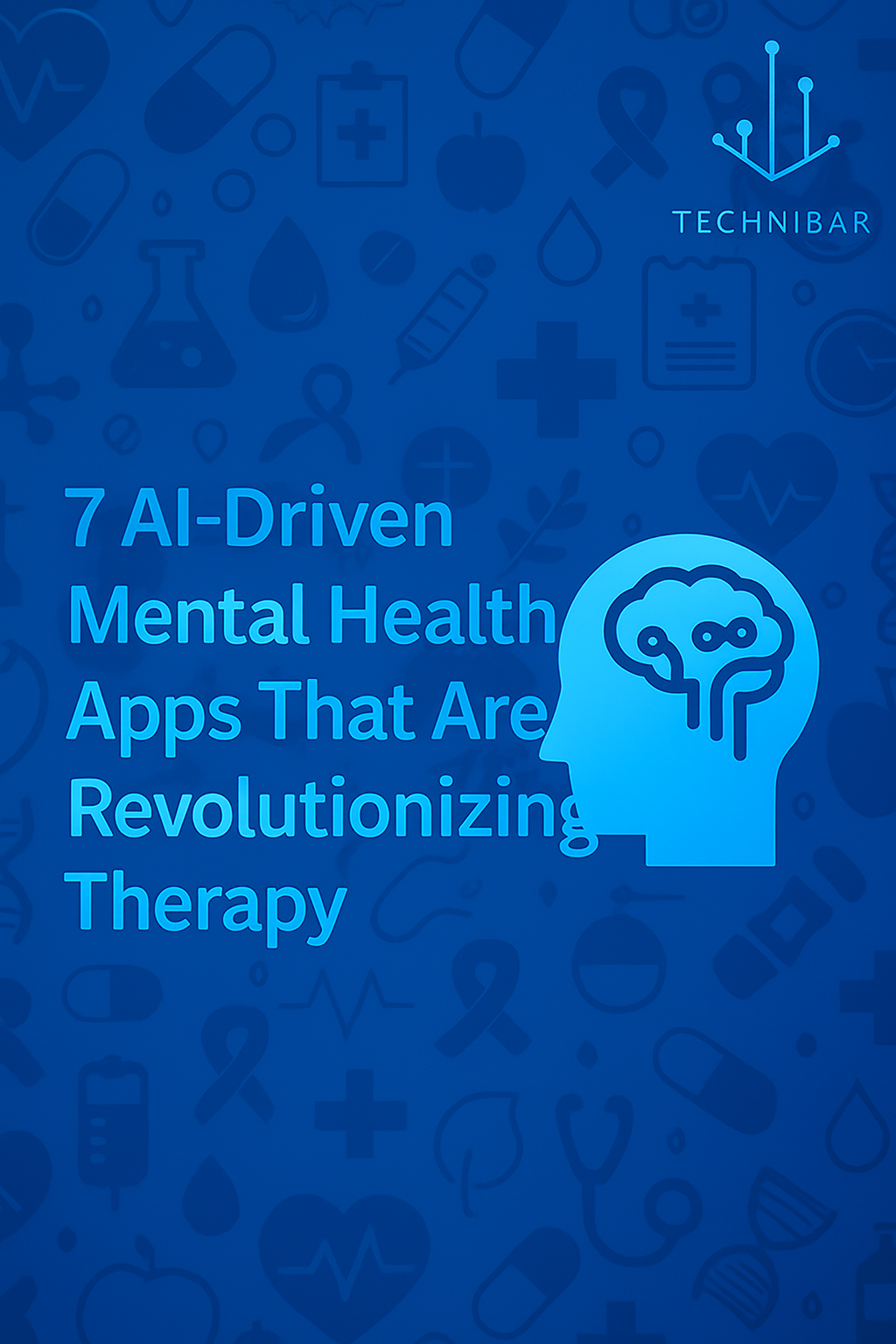Getting mental health care is not that simple all the time, especially when one has an anxious mood, feels alone, or overwhelmed. Although there are more than 10,000 AI-driven mental health applications, very few of them are backed by the existence of meaningful clinical data. In our paper, we are going to look at the seven outstanding applications that either use artificial intelligence, CBT methods, emotion recording, or conversational-based technology to assist individuals to manage their mental health.
Quick Highlights
Wysa
It is a 24/7 therapist in the form of a web and mobile app that features a combination of CBT and NLP and AI, in addition to strong data protection.
Happify
Allows the user to get prompt feedback, mood-tracking systems, and interactive mental-health games, which enables most people to reduce stress in less than a month.
Roots
integrates with wearables to predict a panic attack and even provides the means to reduce the effects of panic attacks in real-time.
AI-driven CBT
The app has already assisted thousands of people to reduce symptoms of anxiety and depression by tracking their mood and performing daily self-help routines.
Woebot
It decreased anxiety and depressive symptoms among groups of students; Replika decreased anxiety by more than 60 percent in one month and is found to be more personable in comparison to conventional therapy.
Yuna
It provides highly customized modules of therapy, depending on an individual pattern of emotion and cultural upbringing.
Wysa: Mental Health Chatbot that is Always-On
Wysa acts as an emotional support robot who is here at your service at any time of the day. Backed by artificial intelligence, natural language processing (NLP), and cognitive behavioral therapy, Wysa assists the consumer to identify unproductive thinking and manage his or her feelings.
- It provides guided methods such as mood journals, breathing, and thought revision, and becomes customized to the input given by the user via machine learning. The privacy of users is its main priority. Wysa interactions are encrypted and confidential.
- Although data on clinical evidence are at an early stage, Wysa has been used to alleviate depressive symptoms in some research studies. This platform is important as it bridges the treatment gap by helping the 70 percent of people who do not get treated because of financial, geographical, and social factors.
Happify: Emotional resilience tools by experience Happify
Happify has a scientific approach to mental-well being utilizing Ecological Momentary Assessment (EMA) and Ecological Momentary Interventions (EMI). These capabilities aid the app to provide “just in time” mental health prompts that are customized to daily routines.
Happify offers:
- Mood logging
- Gratitude activities
- Resilience challenges
Suppose, the app can send you a small quiz when you are in the queue or propose a breathing exercise, when you feel your mood is down. Creating therapy to be enjoyable and reliable, it is based on P. and CBT.
During the four weeks that they use it, the users report reduced stress levels. Happify is also transparent when collecting its data and respecting privacy and fairness is a priority.
Roots: Panic & Anxiety Real-Time aid
Roots is specific towards anxiety and panic disorders. This application with AI is linked to wearables and has the ability to identify physiological reactions to an impending panic attack like an increased heart rate up to 30 minutes before the symptoms occur.
Upon detection of a spike the response of the app is:
- Breathe instructions
- Soothing visualizations
- Impulsive CBT-based activities
An example of what users said about calming experiences: One of them, describing the episode of a panic at a mall, stated that she managed to find calm after following the Roots calming prompts. Apps such as Roots can become a life-saving solution since over 300 million individuals across the globe experience anxiety.
- It upholds stringent data protection standards and is also keenly aware of the need to watch out about algorithmic bias to facilitate inclusive care.
Youper: CBT- individualized in your pocket
Youper is a digital experience that focuses on the self-managed CBT treatment. The app has AI technology to provide personalized exercise that fits the emotional trend and mood pattern of the user.
Randomized clinical data substantiates the effectiveness of Youper, and one such study revealed the reduction of anxiety and depression with about 4,500 users experiencing a moderate degree of reduction. The app was downloaded by more than 3 million people out of which 83% reported that there was an improvement in their level of emotionally well.
The main key points are:
- Artificial intelligence-based therapy dialogues
- Connection of wearable health analytics
- Hybrid care clinician dashboards
Large institutions also use Youper and promote designs that do not violate privacy. It offers professional level tools and still remains user-friendly and inexpensive.
Yuna: Custom Therapy to Growth and Self-Awareness
Yuna adopts a guided self-help. It incorporates CBT into the real-time interaction with AI to provide a highly individualized therapy that only takes into consideration specifics about your personal history, presenting triggers, and culture.
Fueled with OpenAI technology and machine learning, the following are the core functionalities enjoyed by Yuna:
- Individual self-therapy packages
- Mood journaling
- Emergency monitoring and real time assistance links
- Stigma-free anonymous mode Ast– Our love is entirely stigma-free and we have an anonymous mode that allows us to use the site without anyone finding out about us.
- The pricing of Yuna varies between 20-80 dollars per month and links the user with therapist models in hybrid treatment. It is also designed in such a way that it keeps people interested-71 percent of users are still undergoing therapy even after 6 months.
Replika: AI Conversation to Feel Emotion
Replika is not an app that is CBT-oriented, yet it provides emotional support through personal and constant conversations. It adapts to any interactions with the most advanced technology based on NLP and machine learning, allowing responses to become more empathetic and more human with time.
Although Replika:
- Makes emotional relief and talk together
- Assists to lower feelings of loneliness and anxiety
- Available 24-hours at a time
- Replika users revealed an anxiety symptom decrease of 64 percent per four weeks in a recent trial. More than 80 percent describe the app as an easier method of accessing therapy than real-life therapy.
Woebot: AI-Based Evidence-Based Therapist
Woebot is an AI-enabled mental health chatbot based on principles of mental health science that guides users through the process of therapeutic techniques, primarily CBT.
It is powerful owing to:
- Frequent mental health assessments Short daily mental health check-ins
- Mood based individual exercises
- Human-like conversation Natural language conversation
Studies indicate that it aided college students to reduce depressive behavior in only two weeks. The subscription to the use of Woebot costs between $20 and 80 monthly in contrast to the cost of traditional therapy.
The Reason Behind Why AI Mental Health Apps Are Changing the Industry
These are the main reasons why AI-based mental health apps are going to be needed:
Affordable and Accessible: Most of the apps are available on smart phones at no or low cost hence no geographical or financial obstacles.
Availability:
Round-the-clock: They are available at all times of the day which is ideal when access to conventional help is not available.
Privacy-First Design:
The data is encrypted and it is done in anonymous modes, so the user has nothing to be afraid of regarding the stigmatization.
Data-driven:
Machine learning gives a highly personalized experience to the user, as the therapy devices learn the patterns of each and every user and keep improving with time.
Integration of Hybrid:
Hybrid integration is otherwise available on many platforms and can help achieve good results.
Broad Scale:
These devices cater to millions of people in the entire world and more in underserved locations in particular.
Problems and Ethics
Prevented by the possibilities, AI mental health apps have a set of problems associated with them:
Data Sensitivity:
This is highly personal data that such platforms are gathering. Breach of trust may result due to poor data use policies or weak encryption.
Black Box Algorithms:
Users do not usually get the influence of advice generation clearly. The absence of transparency will damage the confidence of the users.
Lapses in Clinical Oversight:
Not every app has a review by a licensed individual, which can lead to ineffective care or even inappropriate advice.
Discrimination in Algorithms:
It is possible that training data is not diverse and as such gives discriminatory suggestions to marginalized users.
Limitations in Emergency Detection:
Crisis words or thoughts of suicide are still not correctly detected in some NLP systems.
The following is the recommendation to developers of making real therapist access and high ethical concern regarding design to ensure safety of a user and provide balance.
The Growing Role of AI in Global Access of Mental Health
The use of AI can be particularly useful where mental healthcare is scarce. Apps have become less heavy enough to work successfully on smartphones, which is why it is possible to meet scalable solutions even in low-resource locations.
The next upgrades can comprise:
Voice and facial recognition of emotion Tuvar 2007 Developing culture
- Physiological predictive signal analytical
- Mood-EEG detection
- The use of real-time chat with AR/VR treatment blocks
These applications develop a new norm of mental health accessibility by pairing AI technologies and human empathy.
Does AI mean the end of human therapists?
Although AI can aid emotional health, it should not be as emotionally involved as required in the case of more or complicated therapy requirements. The best practices now entail hybrid forms of care, in which users communicate with both AI and human counselors.
The most suitable professions to utilize AI include:
- Helping hand every day
- CBT skill development
- Mood tracking
- Crisis prep
- Human therapists continue to play an important role in:
- Troubleshooting the mental disorders
- Handling crises
- Providing intricate compassion and understanding
What AI Therapy Says Science
Early research is promising:
Depressive symptoms improved significantly in two weeks among Woebot users.
- In a study conducted by Youper of 4,500 participants, the results indicated a significant improvement on mood.
- Within a month, Replika managed to decrease anxiety-level by 64%.
- Digital therapeutics remain on the rise, in both the clinical and consumer wellness markets, although additional peer-reviewed research remains necessary
On the Horizon: AI Mental Health Assistance of the Future
There will be more regulatory frameworks, greater connections with health systems, and more transparent AI models in the future. Tools will:
- Despair with insurance providers and medical providers more so
- To do predictive analysis with quantum computing
- Provide individual treatment through wearable sensors
- Provide exploratory AI (XAI) to take responsibility
Conclusion
Mental health apps such as Wysa, Woebot, Youper, and others are not only a fad, however, but are transforming the treatment sphere. Such apps are able to cross such boundaries, provide people with a 24-hour-a-day service, and assist millions of people all over the globe. Nonetheless, ethical conduct, user privacy, and human control have to be changed along with the technology.
FAQs
1. What is CBT in AI mental health Apps?
CBT (Cognitive Behavioral Therapy) is a type of treatment that assists in reformulating unproductive thinking. This is emulated in AI apps, which provide you with custom directions depending on what you feed it.
2. What are the NLP benefits to emotional wellness?
NLP (Natural Language Processing) subdivides your speech in order to identify stress, anxiety, or sadness and prompt you with useful messages.
3. Is it possible that these apps are useful in a crisis?
Crisis support functions are embedded or other people redirect directly to helplines in some apps. Seek out the apps that have emergency procedures.
4. Are my talks secure?
The majority of apps advertise good data protection but never overlook privacy regulations and terms of data processing and sharing.
5. Will AI act as a direct substitute to therapists?
No. AI accompanies the therapy by providing tools and assistance, yet complicated cases will always be solved with human knowledge.








